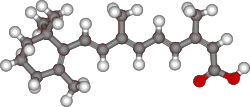13-cis retinoic acid
 |
|
 |
|
| Clinical data | |
|---|---|
| Pronunciation | See note at tretinoin |
| Trade names | Accutane (originator), subsequently many generics |
| AHFS/Drugs.com | Monograph |
| MedlinePlus | a681043 |
| License data |
|
| Pregnancy category |
|
| Routes of administration |
By mouth, topical |
| ATC code | |
| Legal status | |
| Legal status | |
| Pharmacokinetic data | |
| Bioavailability | Variable |
| Protein binding | 99.9% |
| Metabolism | Hepatic |
| Biological half-life | 10–20 hours |
| Excretion | Renal and fecal |
| Identifiers | |
|
|
| CAS Number | |
| PubChem CID | |
| IUPHAR/BPS | |
| DrugBank | |
| ChemSpider | |
| UNII | |
| KEGG | |
| ChEBI | |
| ChEMBL | |
| ECHA InfoCard | 100.022.996 |
| Chemical and physical data | |
| Formula | C20H28O2 |
| Molar mass | 300.44 g/mol |
| 3D model (JSmol) | |
|
|
|
|
Isotretinoin, also known as 13-cis-retinoic acid, is an medication primarily used to treat severe acne. Rarely, it is also used to prevent certain skin cancers (squamous-cell carcinoma), and in the treatment of other cancers. It is used to treat harlequin-type ichthyosis, a usually lethal skin disease, and lamellar ichthyosis. It is a retinoid, meaning it is related to vitamin A, and is found in small quantities naturally in the body. Its isomer, tretinoin, is also an acne drug.
Isotretinoin is primarily used as a treatment for severe acne. The most common adverse effects are a transient worsening of acne (lasting 2–3 weeks), dry lips (cheilitis), dry and fragile skin, and an increased susceptibility to sunburn. Uncommon and rare side effects include muscle aches and pains (myalgias), and headaches. Isotretinoin is known to cause birth defects due to in utero exposure because of the molecule's close resemblance to retinoic acid, a natural vitamin A derivative which controls normal embryonic development. It is also associated with psychiatric side effects, including depression.
In the United States, a special procedure is required to obtain the pharmaceutical. In most other countries, a consent form is required which explains these risks. Women taking isotretinoin must not get pregnant during and for 1 month after the discontinuation of isotretinoin therapy. Sexual abstinence or effective contraception is mandatory during this period. Barrier methods by themselves (e.g., condoms) are not considered adequate due to the unacceptable failure rates of approximately 3%. Women who fall pregnant whilst on isotretinoin therapy are generally counselled to have a termination. Isotretinoin has no effect on male fertility.
...
Wikipedia
